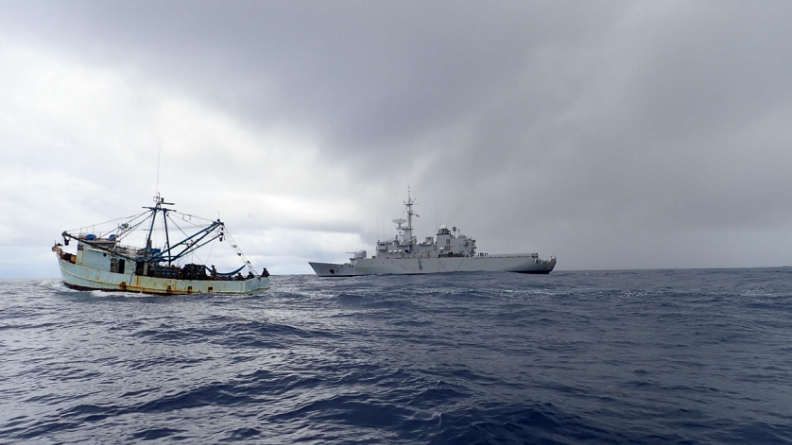On 21 September, under the direction of the Maritime Prefect of the Atlantic and the Prosecutor of the Republic of Brest, the surveillance frigate (FS) Ventôse of the French Navy seized 2.4 tons of cocaine from a fishing boat off West Africa. This operation was conducted on the basis of an investigation by the Brazilian Federal Police in cooperation with the British National Crime Agency (NCA) and the US Drug Enforcement Administration (DEA).
Supported by the Falcon 50 of the French Navy detached to Dakar, Senegal and the Dauphin helicopter embarked aboard the surveillance frigate Ventôse, the FS visiting team intervened at dawn on the high seas, Thursday, September 21, 2023, on a fishing boat without flag. The operation was initiated on the basis of Article 110 of the United Nations Convention on the Law of the Sea (Montego Bay), and resulted in the discovery of narcotic drugs. A total of 2.4 tonnes of cocaine was found on board and transferred to the MSDS for destruction.
The 20-metre-long fishing boat had left the Brazilian coast a few days earlier. The sea route taken could suggest that the cocaine was destined for Europe.
The perfect cooperation between national and international actors in the fight against narcotics, in particular the Maritime Intelligence Analysis Operations Center for Narcotics (MAOC-N), the Anti-Narcotics Office (OFAST) and the diplomatic network of the Ministry for Europe and Foreign Affairs (MEAE), has made it possible to obtain this result, which illustrates the commitment of French resources in the Gulf of Guinea against organized crime.
The surveillance frigate Ventôse has been engaged since mid-September in Operation Corymbe to contribute to maritime security and fight against illicit activities in the Gulf of Guinea in conjunction with our African and European partners.
The French Navy deploys one or two French ships supported by a maritime patrol aircraft in the Gulf of Guinea on an almost permanent basis as part of Operation Corymbe. It thus completes the French system in West Africa by participating in the maritime component of operational cooperation. Through its presence in the area, France participates in the development of the maritime security architecture resulting from the Yaoundé process. In addition, this deployment is in line with the European Union’s concept of a coordinated maritime presence.

